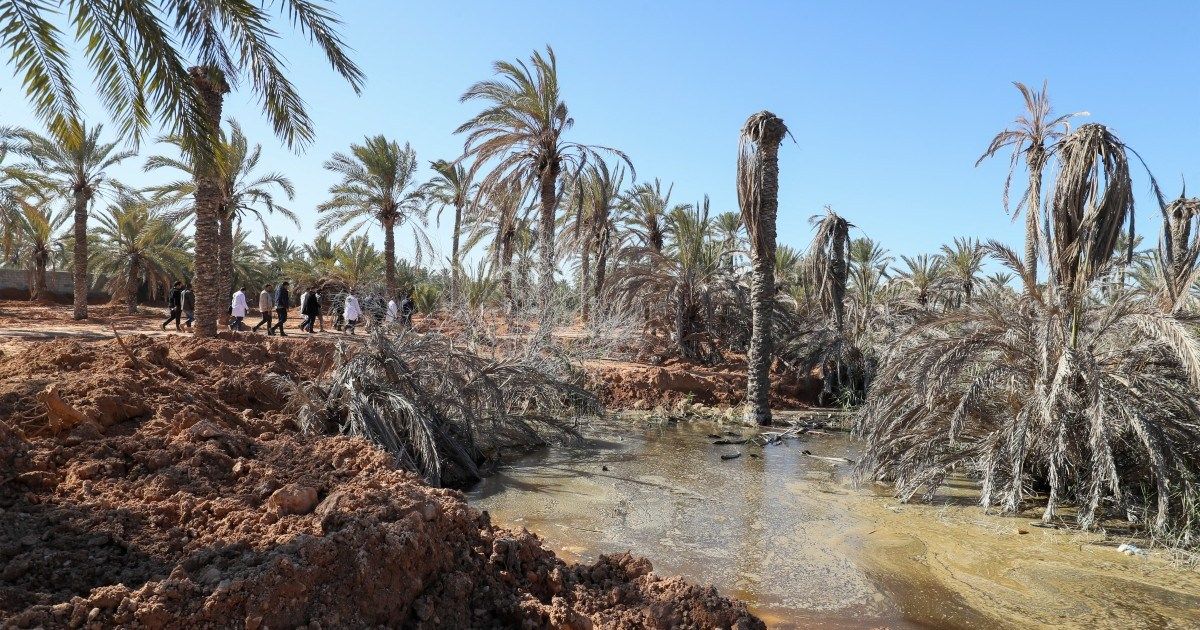Much of Libya is a bone-dry desert, but one Mediterranean coastal city is suffering from the opposite problem: its homes and fields have been inundated by a mysterious surge of groundwater.
Stagnant water and soft mud have flooded houses, streets and palm groves around the northwestern city of Zliten, spreading a foul odor and creating breeding grounds for mosquitoes.
Many residents have fled their homes, where walls have cracked or collapsed, amid fears of a worsening environmental crisis in the area about 160 kilometers (100 miles) east of the capital, Tripoli.
“The water started coming out two months ago and is still rising and submerging our wells,” said Mohamad Ali Dioub, owner of a farm about 4 kilometers (2.5 miles) from Zliten. “All my fruit trees (apple, apricot and pomegranate trees) are dead.”
The 60-year-old said he had rented tankers to pump out the standing water and bought piles of sand to dump on the soggy ground in an effort to save some of his valuable date palms.
The area's normally sandy, light soil has turned “muddy, black and smelly,” said Mohamad al-Nouari, another farmer, whose land was completely flooded.
Nearly 50 families have been relocated, said Moftah Hamadi, mayor of Zliten, a city of 350,000 known for its Sufi shrines, al-Asmariya University and its palm and olive groves.
Prime Minister Abdul Hamid Dbeibah this month promised to “remedy this crisis scientifically and quickly” and urged authorities to compensate or relocate displaced families.
But there is still no consensus on the causes of the floods.
Libya has been plagued by conflict and turmoil since the fall of Muammar Gaddafi's regime in 2011 and is now governed by two rival administrations, based in Tripoli and Benghazi.
Catastrophic floods devastated the eastern Libyan city of Derna in September when two dams collapsed. The massive flood killed more than 4,300 people and left more than 8,000 missing, according to the United Nations.
Zliten residents say groundwater flooding is not new and point to areas covered in reeds due to flooding years ago. But they also say that the phenomenon has affected them on a scale hitherto unknown. Media reports have pointed to a variety of possible causes, from poor drainage infrastructure to damaged pipes and heavy winter rains.
Foreign specialists, including from Britain, Egypt and Greece, have traveled to Zliten in the hope of identifying the source of the problem and finding solutions.
In other parts of the world, sea level rise has been linked to increases in coastal groundwater, as dense salt water can seep deep into the ground and push up lighter fresh water.
Meanwhile, Libyan authorities have denied any link between the floods and the so-called Great Man-Made River, a giant network of Gaddafi-era pipes that funnels water from an aquifer far beneath the southern desert to irrigate coastal agricultural areas.
The project management company, as well as the country's main water and energy companies, have joined forces to alleviate the terrible situation in the city. The country's National Center for Disease Control has sent emergency teams, equipment and pesticides to eradicate the mosquito swarms.












